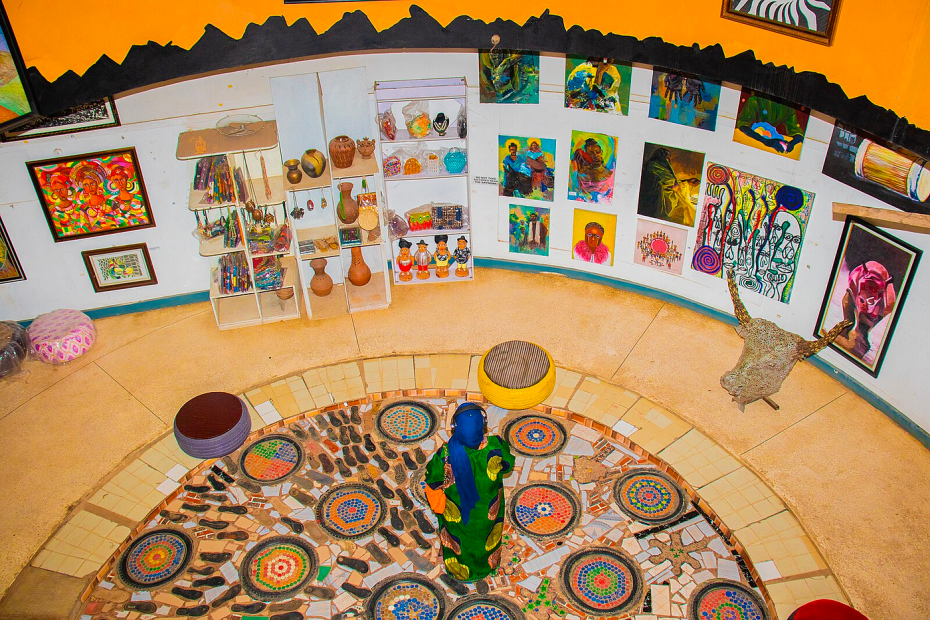Table of Contents
Introduction
Nigeria is the most populous country in Africa and home to a vibrant, diverse culture. With over 250 ethnic groups and more than 500 languages spoken, Nigeria’s cultural heritage is rich and multifaceted. From traditional festivals to contemporary art and film, Nigeria’s cultural contributions reverberate across the continent and around the globe. This article will provide an overview of Nigeria’s most notable cultural treasures.
Music and Dance
Music is integral to cultural life in Nigeria. Traditional genres include Fuji, Highlife, Juju, Apala, and Afrobeat. Contemporary styles like Afrobeats, Afro-hip-hop, and Afro-pop have gained global popularity in recent years. Nigerian musicians like Fela Kuti, King Sunny Ade, and 2face Idibia have become international stars. Popular dance styles also showcase Nigeria’s musical heritage, such as Bata dance and cultural masquerades. The Lagos Carnival showcases energetic music and dance performances.
Arts and Crafts
Nigeria has a strong artistic tradition evident in its vibrant crafts sector. Nigerian fashion utilizes colorful fabrics like adire, aso oke, and ankara to create stunning garments. Intricate hand-woven textiles and elegant clothing designs define Nigerian style. Nigerian visual arts range from Yoruba sculpture and Igbo Uli body and mural painting to contemporary artists like Ben Enwonwu and Yinka Shonibare. Crafts like bronze casting, pottery, woodcarving, and beadworking highlight local artistry.
Cuisine
Nigerian cuisine varies by region but commonly features staples like rice, yams, beans, plantains, and cassava. Spicy meat and fish stews are popular dishes. Signature Nigerian foods include jollof rice, egusi soup, suya kebabs, puff puff, and palm wine. Local crops like okra, melons, and peppers are used in many recipes. Food culture in Nigeria is lively and communal with its love of flavorful, robust dishes.
Languages
With over 500 native languages, Nigeria reflects vast linguistic diversity. Major languages include Hausa, Igbo, Yoruba, Fulani, and Kanuri among others. While English remains Nigeria’s official language, local languages connect people to their ethnic heritage. Codeswitching between Nigerian languages and English is common. This linguistic plurality has enriched national culture.
Religion
Nigeria is almost evenly split between Christianity and Islam, with indigenous belief systems still practiced. Religious festivals like Eid al-Fitr, Easter, and masquerade ceremonies are celebrated across the country. Sacred sites like the Osun-Osogbo Grove and Arochukwu Caves reflect Nigeria’s spiritual history. Many major cities feature architectural marvels like mosques and cathedrals.
Literature
Nigeria possesses a strong literary tradition. Early Nigerian writers like Amos Tutuola gained fame for works based on Yoruba folktales. Chinua Achebe’s Things Fall Apart is considered a seminal novel. Wole Soyinka became the first African Nobel laureate in literature in 1986. Contemporary Nigerian authors like Chimamanda Ngozi Adichie and Helon Habila continue to win acclaim. Their work provides insight into Nigerian society.
Film Industry
Nigeria’s film industry, nicknamed “Nollywood”, is a cultural powerhouse. Beginning in the 1990s, affordable digital technology allowed Nigerian filmmakers to transform the industry into the world’s second largest film producer. Nollywood films are exported globally and have expanded their international reach through streaming services. Popular actors like Genevieve Nnaji and Omotola Jalade-Ekeinde have achieved widespread fame.
Cultural Sites
From museums to historic architecture, Nigeria has many cultural institutions and landmarks. The National Museum in Lagos and the Igbo-Ukwu Museum showcase Nigerian artefacts. UNESCO World Heritage Sites like Sukur Kingdom and Osun Grove highlight achievements of past civilizations. Other major sites include the Jos Wildlife Museum, Lekki Conservation Centre, and Oba’s Palace in Benin City.
Cultural Expression
Nigerian culture comes to life through vibrant public festivities. Durbar festivals feature elaborate horsemanship and regalia. Storytelling, myths, and proverbs promote community values. Masquerade dances are integral parts of ceremonies and rituals. Nigerian culture emphasizes participation, with music, dance, and costumes allowing communal experiences.
Conclusion
From the pulse of the drums to the voices of its celebrated writers, Nigeria’s cultural riches reveal Africa in all its grandeur. As a leading force in African culture, Nigeria continues to export its talents while maintaining traditions that connect its diverse communities. By preserving its heritage and promoting cultural exchange, Nigeria spreads its incredible artistic wealth abroad. Experiencing Nigeria’s dynamic culture provides a glimpse into the heart of Africa.
FAQ 1: What are some examples of traditional Nigerian music genres?
Some examples of traditional Nigerian music genres include Fuji, Highlife, Juju, Apala, Waka, Dadakuada, and Afrobeat. Each genre incorporates distinct rhythms, instruments, and singing styles that reflect Nigeria’s cultural diversity.
FAQ 2: What materials are commonly used in Nigerian arts and crafts?
Nigerian arts and crafts employ various materials including bronze, terra cotta, wood, glass, fabrics, beads, and precious metals. Textiles like adire and aso oke are made from handwoven cloth. Sculptures and carvings use wood, stone, and metals. Intricate patterns on pottery and beads showcase Nigerian artistry.
FAQ 3: What are some key ingredients used in Nigerian cuisine?
Some key ingredients in traditional Nigerian cuisine include rice, yams, plantains, beans, okra, chili peppers, palm oil, peanuts, melon seeds, pumpkins, spinach, and cassava. Spices like thyme, ginger and nutmeg add flavor to Nigerian dishes. Popular meats include beef, goat, fish and chicken.
FAQ 4: How has Nigerian literature evolved over time?
Nigerian literature has progressed from early oral storytelling traditions to influential postcolonial African literature. Pioneering writers like Amos Tutuola gave way to acclaimed novelists such as Chinua Achebe and Wole Soyinka. Contemporary Nigerian authors are achieving global prominence, including Chimamanda Ngozi Adichie, Helon Habila and Chigozie Obioma.
FAQ 5: How has Nollywood impacted Nigerian culture?
Nollywood has amplified Nigerian culture globally, spreading Nigerian stories, languages, values and creativity. Within Nigeria, Nollywood employs thousands and generates national pride. The industry connects diaspora Nigerians to home. Nollywood has shaped Nigeria’s international image and shadowed the country’s changing realities.
